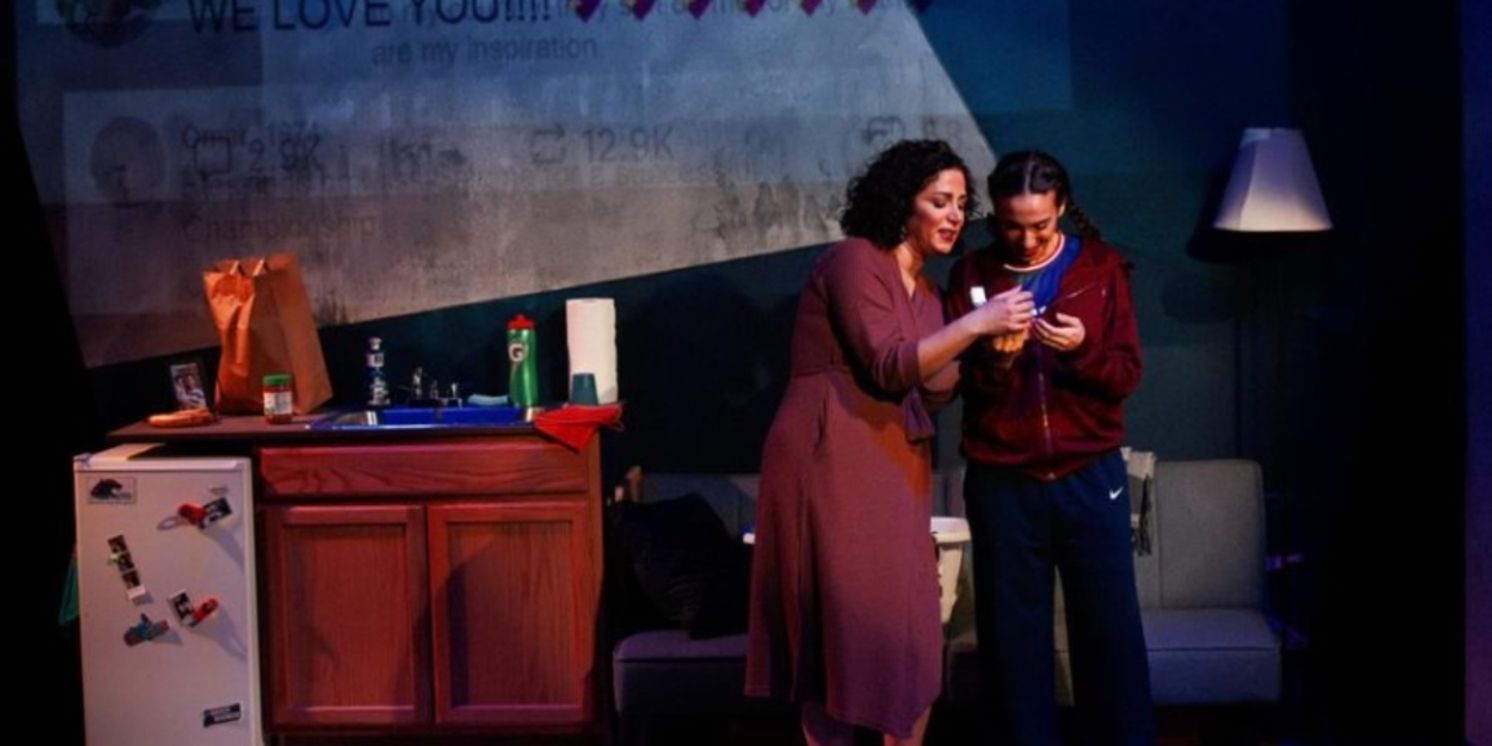Review: AMERICAN FAST at Theater Alliance
Showing at the Theater Alliance pop-up in The Westerly from March 20 through April 13.

American Fast by playwright Kareem Fahmy was a loud and lively production that explored the intersection of sports, womanhood, and faith.
The narrative follows Division One Women’s Basketball player Khadija “Khady” Salam as she figures out how to balance her identities: Egyptian, American, Muslim, young adult, woman, athlete, daughter, and girlfriend. All aspects are fighting for her attention as March Madness (NCAA women’s basketball national championship tournament) and Ramadan (the Muslim month of abstaining from water and food from sunrise to sunset) begin at the same time. Her mother expects her to follow her culture and fast, and her coach expects her to follow her passions and perform. Their expectations could not be more conflicting, and yet Khady is convinced that she can meet them both. Her confidence and naivety drive her to make broken promises and isolate herself from the people who could help, and all this is happening while she’s in the limelight as she receives media attention for her “inspiring” identity she feels pressured to upkeep.
Utilizing Theater Alliance’s pop-up theater space, the set design was efficient and immersive under the direction of scenic designer Nadir Bey. To the left, a towering basketball hoop was tucked behind lockers; across the stage was a dorm room kitchen and sofa bed; and in the center, an ambiguous blue box acted as a desk, bar table, and bench, depending on the scene projected on the back screen. The set relied on the transformative lighting by designer Minjoo Kim to hide or emphasize the relevant pieces, making the scenes feel as big as a basketball court or as small as a college apartment.
Though the production had just four actors, the use of pre-recorded voices and visuals filled out the scenes with post-game interviews and internet comment sections. The audience was also immersed in the setting, sitting in bleachers “courtside.” They were encouraged to participate and organically engage in the production with a rallying cheer of “Let’s go panthers.”
True to the name, the exposition came fast: The audience was introduced to the characters as they were questioned about the defacing of the campus athletic center with Khady’s name (literally) written all over it. The conflict and the pacing were immediately established in medias res, as all discussed Khady’s chance to play in the championships despite being exposed for not fasting.
This interrogation also revealed the characters’ personalities: headstrong-to-a-fault Khady (Gigi Cammarato), her pious and emotional mother (Raghad Makhlouf), her defensive and poised coach (Renee Elizabeth Wilson), and her perceptive and impassive ex-boyfriend, Gabe (Travis Xavier). It was impressive how well each actor matched the energies of such intense and expressive characters. Makhlouf’s range was especially notable as she went from singing serenely to trembling and crying with grief, and Xavier’s disappointment when he felt Khady was using him was as convincing as his joy when they were together.
Cammarato’s character work was strong and fierce, but the play fumbled the ball when it came to showing her nuances. Instead of building scenes to portray Khady’s personality further, the characters psychoanalyzed Khady to tell the audience what to think about her: Kady’s mother reminds her to fast and “be a good Muslim girl;” her coach tells her “you only think about your self and not the team;” and Gabe teases Khady “you don’t like not being in control.” There was no subtlety in the way she resisted everyone’s criticisms and insisted she didn’t need help even when the characters were directly telling her her flaws.
It was easy to scrutinize Khady’s actions and the way that she treated the people around her, but one could also envy her for her rebellious tenacity, making her both frustrating and empowering as a character. She is scrutinized by her mom, coach, boyfriend, school, and social media all at once, and the production stresses this motif of surveillance. Effective projections of social media comments and the Eye of Providence emphasize the influences watching her, and there are spiritual discussions about Allah watching over her and how that stresses her out.
Khady has something akin to a spiritual break in the big finale when she gets to play the championship and jumps up to make the winning basket. It’s presented as a cathartic moment between Khady and her God, but it’s not that convincing of a moment if her problems are just solved by her mid-jump and staring off into the crowd exclaiming, “I understand now! I know what God is!” The narrative is set up to encourage this shift in her personality, but only showing this epiphany in the final moments when Khady is getting everything that she wanted didn’t feel completely justifiable. Regardless, when the ball hits the net and the heavenly spotlight fades out, Khady is apparently on her way to a better understanding of herself and her relationships, and you can’t help but cheer for her.
Overall, American Fast illuminates the struggle of feeling out of place in the spaces you desire to take up with the drama and rush of spectating a sport. It was emotional, fun, and direct, and a unique way to celebrate International Women’s Month, Ramadan, and March Madness all at once.
Photo credit: Theater Alliance. Photo courtesy of the production
Reader Reviews
Videos

